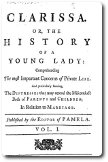Tess of the d'Urbervilles Contents
- Social / political context
- Religious / philosophical context
- Chapters 1-9
- Chapters 10-19
- Chapters 20-29
- Chapters 30-39
- Chapters 40-49
- Chapters 50-59
- Tess as a 'Pure Woman'
- Tess as a secular pilgrim
- Tess as a victim
- The world of women
- Tess as an outsider
- Coincidence, destiny and fate
- Disempowerment of the working class
- Heredity and inheritance
- Laws of nature vs. laws of society
- Modernity
- Nature as sympathetic or indifferent
- Patterns of the past
- Sexual predation
- Inner conflicts: body against soul
The use of letters
The epistolary novel
 The epistolary novel was one of the earliest forms of novel, consisting of a series of letters to and from the main characters. Building on the tradition of Samuel Richardson's Pamela and Clarissa, Jane Austen's first attempts at novel writing were epistolary, and certainly letters play important roles at crucial moments in her stories.
The epistolary novel was one of the earliest forms of novel, consisting of a series of letters to and from the main characters. Building on the tradition of Samuel Richardson's Pamela and Clarissa, Jane Austen's first attempts at novel writing were epistolary, and certainly letters play important roles at crucial moments in her stories.
In history and in literature, we read letters for the insight into character they give as much as for the information that may be contained. Letters presuppose well-educated characters and a well-ordered postal service, which the Victorians had. Above all they presuppose absence.
Letters in the first half of Tess
The earlier section of Tess consists mainly of characters being present with each other. Opportunities for letters are small, apart from arranging business affairs, such as Tess's appointments to 'The Slopes' or Talbothays. Hardy does not bother to write these out.
More surprisingly, perhaps, Hardy does not write out the first important letter Tess writes: her confession to Angel. This is paralleled later, when her oral confession is not given verbatim either. Whilst readers obviously know the facts contained in the letters, it would be interesting to see how Tess defends herself, if she does. However, Hardy only provides a fragment of her confession, at her first attempt.
By contrast, we do get Joan's letter of advice to Tess. Its quaint spelling gives it a comic aspect - we are perhaps surprised Joan can write at all in the days before universal education. Ironically, the advice is predictable and Tess feels she cannot follow it.
Letters in the second half of Tess
In the later stages of the novel, where absence is a growing factor, letters are more frequent, but still not plentiful, especially as Angel has forbidden Tess to write. The obvious highlight is Tess's impassioned letter to Angel (Ch 48), which is heart-breakingly eloquent, and sadly not appreciated by Angel soon enough.
Hardy thus uses letters to suggest non-communication, or ironically, communication too late or disregarded. They become part of the ironies of circumstance. Even after Angel receives Tess's angry, second letter (Ch 53), his complacency makes him too slow to act.
